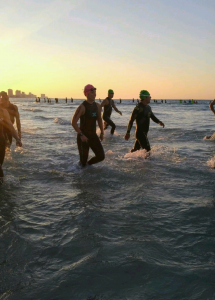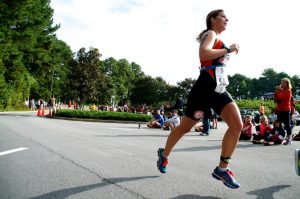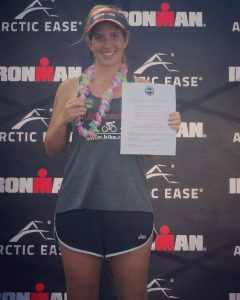Jessica Lambert couldn’t feel her hands or feet.
As she shuffled up a steep hill her only confirmation of progress was by looking down.
Though the sun had set, and Kona, Hawaii, was covered in a curtain of pitch blackness, that callous globe of flame that illuminated the sky for the better part of the day had done its damage.
The temperature was 96 degrees and her thighs and forearms – sticky, salty and washed clean of sunscreen by ocean waves that tossed her about like flotsam early that morning – were seared.

Pain was her unremitting companion on the dark road toward the finish.
“It was just hurtful to take each step,” Lambert said. “My mind is saying ‘you’ve made it this far, you can make it to the end. If you have to walk, walk.’
“Once I started running again I just told myself I could get all the water I wanted when I got done. …When I saw the finish line I was definitely crying at that point. I was just ready to be done knowing that I had survived that day. I was crying mostly from pain, but because of emotion as well.”
On Oct. 14 in Hawaii, 13 hours and 49 minutes after starting the 140.6-mile Ironman World Championship triathlon, Lambert, a 21-year-old senior pre-med exercise science major at UA, crossed the finish line.
The Cleveland native accomplished what very few triathletes have ever done – she qualified for, competed in and completed the most arduous triathlon in the world, earning the title of Ironman.
Cathy Pagani, associate dean of the Graduate School, assistant to the provost and faculty adviser of UA’s Alabama Triathletes, which Lambert is president of, said as an Ironman finisher herself, she knows it is a prodigious accomplishment.
“The big moment was getting there because we all aspire to do it and only 1 or 2 percent of us do,” Pagani said. “Actually doing Kona is just gravy, despite if you are a top finisher or not. She will always be a Kona Ironman finisher and that is just incredible.”
Qualifying and Training for the World Championship
Lambert, who has competed in triathlons since she was 10, qualified for the world championship last November when she won her age group – 18-24 – in the Ironman Florida competition in Panama City.

She said she entered Ironman Florida with no intentions of qualifying for the world championship. She was just honored to participate.
When she found out she qualified she was overwhelmed, and had one day to accept the invitation.
“It was a lot of pressure because it cost $1,000 to register,” she said. “I also had to pay for my flight and lodging. I’m a college student so I don’t have that income, but I did a GoFundMe page and got some help from family and friends.”
After taking a brief break, Lambert started training. She trained five to six hours on Sundays and one to two hours throughout the week.
“Every time I finished long runs of 15 miles it was such an amazing feeling and I’d tell myself I can push further,” she said. “You just want to see what your body can do. I grew up a swimmer so I wasn’t worried about that before in the qualifier.”
The members of Alabama Triathletes helped her train and kept her motivated.
“I’ve trained with them the whole time I’ve been here. We’re a very close team, which is nice.”
She arrived in Hawaii on Oct. 10 and enjoyed time with her family as well as a luau held for the championship’s 2,000 competitors before preparing for the race on Oct. 14.
Day of the Competition
The first event – the ocean swim – started at 7:10 a.m. for the age group competitors. The approximately 750 competitors were asked to tread water before the race started.
“It was really cool to have that mass start, but as a swimmer it was really crazy because you couldn’t take a stroke without someone being on top of you,” she said. “It was very congested, very wavy. I got nauseous.
“Here in Tuscaloosa I practiced in lakes and pools, but it’s nothing like the ocean. I did the first half in five minutes, but when I turned around I slowed down a lot.”
After the 2.4-mile swim, she transitioned to the 112-mile bike race. The first five miles were uphill.
“The next 30 miles after that I felt pretty good. I was able to handle it, but around mile 40 the wind really picked up. It was so nerve wracking. They were crosswinds and I had to grip onto the aero bars on my bike because I thought I was going to fall off because the winds were so strong.”
Lambert was supposed to get a bag with power bars and other supplements halfway through the bike race, but something went wrong and she didn’t get it. That hurt her morale and her energy.
“So that was kind of sad because I had just gotten on top of a hill and didn’t have my nutrition. It was super hot, I was getting sun burned. That was a low point. I just had to move on and do what I could.
“At that point I am really just racing to enjoy it and finish. Cycling was my worst sport in the triathlon.”
Last came the 26.2-mile run, which is generally her best sport. But she was exhausted at its start.
Around mile 13 into the run, the sun set and the contestants were given glow sticks because there were no streetlights.
“It was just hurtful to take each step at that point. I was just thinking about finishing. The hardest part about the run is that they had all the big hills in the last few miles.”
Leaving Kona an Ironman

Lambert hopped on a plane to Tuscaloosa the next day. She couldn’t walk so her boyfriend took her through the airport in a wheelchair.
After 24 hours of travel, she got back to Tuscaloosa at 2 p.m. on Oct. 16 and immediately prepared for a presentation.
Looking back on the competition, she said it was once-in-a-lifetime experience that she’s glad she had. But for her, that’s where the Ironman World Championship needs to remain: a once-in-a-lifetime memory.
“Right now I just want to concentrate on getting into medical school. As cool and challenging as it was, I am very happy that I’ve done it.”
